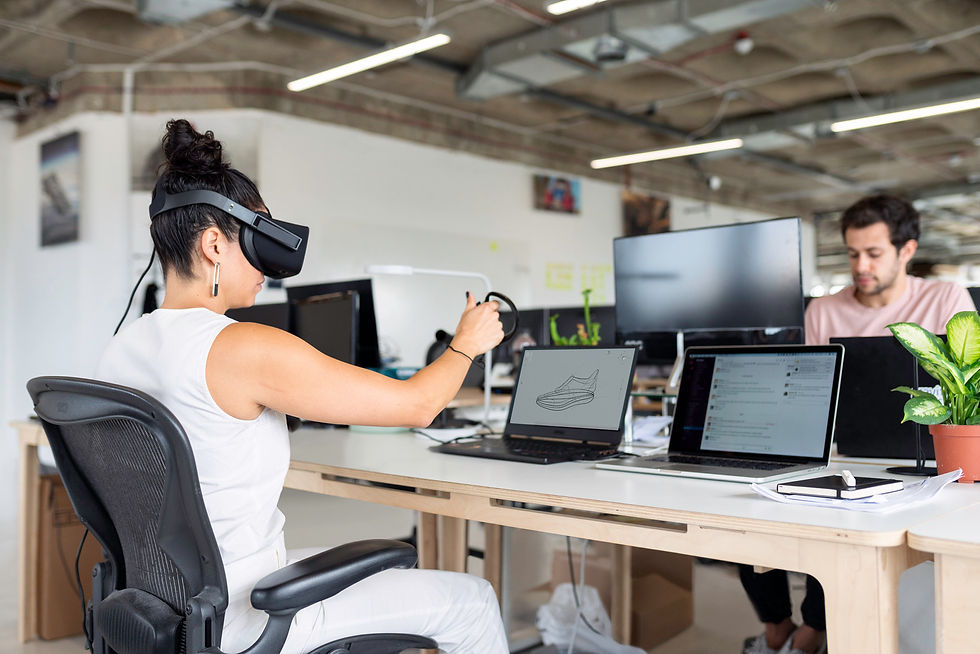Machine Development Technologies That Will Change the Way We Work
- Lydia Lorraine
- Mar 11, 2020
- 3 min read

Developments within the technology industry are vast, and at times it can be difficult to keep track of that which will make the greatest impact on life as we know it. Machine and artificial intelligence technology are changing the way we live, work and interact with each other.
2020 marks the beginning of the Decade of Tech. Independently funded companies like Tesla are developing ground-breaking technologies that are becoming more advanced at an ever-increasing speed. It is easy to become out of date with new developments, with new software and updates being released almost daily. Below are just a few examples of tech that have recently hit the markets that will have an impact on the way we do business, now and in the future.
Conversational AI

Behind familiar processes such as speech-enabled applications and automated messaging systems is the technology of Conversational AI, the development of human and computer interaction. The software involves designing a seamless and instantaneous conversational flow, which requires the software to recognise context, relevance, understanding of intent, produce an automated translation and implement speech recognition patterns. The goal of Conversational AI is to imitate human interaction.
Popular TV and films such as Ex Machina and WestWorld depict the ultimate goal of Conversational AI, to produce a software that is so efficient in communication that is indistinguishable from human conversation. However, the technology is in early development, and a WestWorld dystopia is far in the future. Currently, the technology enables users to manage business tasks more efficiently by deploying powerful conversational AI interfaces, such as end-to-end bot hosting platforms.
Automated Security Systems

AI security is probably one of the fastest-growing areas of AI development being used by small and large businesses alike. AI security refers to the use of cyber techniques and computerised tools to identify actual and potential threats based on patterns of activity. Security AI is in continuous development to efficiently identify automated fraud, detect intrusion and calculate risk probability for logins in real-time. AI security programs are designed to work harmoniously across businesses, minimising any disruption to day to day activity. The automated frameworks correlate any unusual or threatening patterns of activity across huge datasets. The most common household security programs include antivirus programs and firewalls, encryption programs and anti-spy software.
Autonomous AI

Socially-enabled domestic robots and automated production assistants are just some examples of new technology that is being developed at companies like Tesla, Microsoft, and Bosch. Autonomous systems are designed to operate in open-ended environments, where complex information needs to be processed quickly and seamlessly. The Tech meets at a crossroads between robotics and artificial intelligence, with a particular focus on the integration of automated methods. The automated system will create complete cognition-enabled robotic systems, with software available to download from open-source libraries as new software is released. Robots can complete tasks that transform lives, like supporting households with complex needs and revolutionising factory assembly lines.
Probabilistic Programming

Probabilistic Programming is the use of complex algorithms to predict the probability of occurring events. Probabilistic Programmes make informed decisions on behalf of individuals and companies in times of uncertainty. The technology is developed by taking programming languages and incorporating them into statistical models, that can be reused as packages for individuals and corporations. The software is currently making waves in the trade and advertising business and is being used to recommend specific products consumers. As programs and software are becoming better at dealing with probabilities and randomness, they are making current computer aids more workable, making AI the next partner in business decision-making, which could potentially lead to an automated marketing system, opening doors for smaller businesses with limited funding for a marketing team.
Virtual Reality

Business is booming in Virtual Reality research with the introduction of affordable VR Headsets. VR Products are only going to get better and businesses are starting to take advantage of this new way of interacting with the software. Virtual Reality is a sister technology to Augmented Reality, which is already being used by Snapchat and Instagram, enabling users to alter their appearance or environment with the use of filters. Virtual reality takes this one step further, by transporting the user into a virtual world where travel can happen in an instant and objects can be conjured up by just simply describing them. VR means that businesses can download training programs for their employees, or carry out tasks without being present. It can revolutionise the way we work. Remote working could become the norm as VR technology becomes more advanced and more accessible to the public.
Lydia Lorraine is a freelance writer and content creator based in the UK. She has published works on the behalf of healthcare providers, retailers and social networking groups. She has a M.A in Research, and examples of her work and contact information can be found at www.lydialorraine.com.

Comments